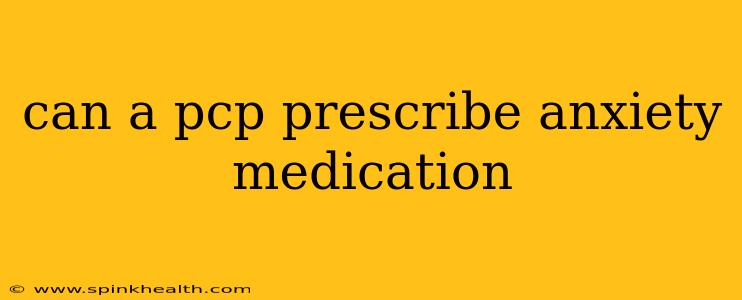Can a PCP Prescribe Anxiety Medication? Navigating Your Path to Relief
The short answer is: yes, often. But let's unpack this common question and explore the nuances. Imagine this: you're feeling overwhelmed, your heart races at the slightest trigger, and sleep feels like a distant dream. You're struggling with anxiety, and you're wondering who can help. Your primary care physician (PCP), that familiar face you see for check-ups, might be your first port of call.
Many PCPs are well-equipped to diagnose and treat anxiety, especially mild to moderate cases. They can assess your symptoms, rule out other potential medical causes, and discuss treatment options. This could involve lifestyle changes, therapy recommendations, and, yes, even prescribing medication.
However, it's not always a straightforward "yes." The level of anxiety, the presence of co-occurring conditions, and the PCP's specific training and comfort level all play a role.
What type of anxiety medications might a PCP prescribe?
A PCP might prescribe various medications depending on the type and severity of your anxiety. This could include:
- Selective Serotonin Reuptake Inhibitors (SSRIs): These are commonly prescribed for anxiety disorders like generalized anxiety disorder (GAD) and panic disorder. Examples include sertraline (Zoloft) and escitalopram (Lexapro).
- Serotonin-Norepinephrine Reuptake Inhibitors (SNRIs): These medications affect both serotonin and norepinephrine, neurotransmitters involved in mood regulation. Venlafaxine (Effexor) is an example.
- Benzodiazepines: These are generally used for short-term relief of severe anxiety symptoms due to their potential for dependence. They are usually prescribed cautiously and for a limited time. Your PCP might only prescribe these in specific situations.
When might a PCP refer you to a specialist?
While many PCPs manage anxiety, some situations necessitate a referral to a specialist, such as a psychiatrist or psychologist. This might be the case if:
- Your anxiety is severe or doesn't respond to initial treatment: A psychiatrist has specialized training in diagnosing and treating mental health disorders, including anxiety. They have a broader range of medication options available.
- You have a complex medical history: If you have other health conditions that could interact with anxiety medication, a specialist may provide a more comprehensive approach.
- You have co-occurring mental health conditions: For example, if you're struggling with anxiety and depression simultaneously, a specialist can provide integrated care.
- Your PCP feels uncomfortable managing your specific case: Some PCPs may prioritize referring patients for complex cases to ensure the best possible care.
What are the alternatives to medication for anxiety?
Medication isn't always the answer. Your PCP might suggest other approaches, including:
- Therapy: Cognitive Behavioral Therapy (CBT) and other therapeutic approaches can be highly effective in managing anxiety. Your PCP can provide a referral to a therapist.
- Lifestyle changes: Stress-reduction techniques like exercise, mindfulness, yoga, and improved sleep hygiene can significantly impact anxiety levels. Your PCP can offer guidance and resources in this area.
Does my insurance cover anxiety medication from my PCP?
Insurance coverage for anxiety medication varies widely depending on your plan and provider network. It's best to contact your insurance company directly to understand your specific coverage. Your PCP's office can also assist in verifying coverage before prescribing medication.
What are the side effects of anxiety medication?
Each medication has a unique profile of potential side effects, ranging from mild to severe. Your PCP will discuss these possibilities with you before prescribing medication and monitor you closely for any adverse reactions. Open communication with your doctor is key.
Remember, navigating anxiety can feel isolating. Talking to your PCP is a crucial first step in seeking help and finding the right path toward managing your anxiety and regaining a sense of well-being. Don't hesitate to share your concerns and ask questions—your healthcare provider is there to support you.

